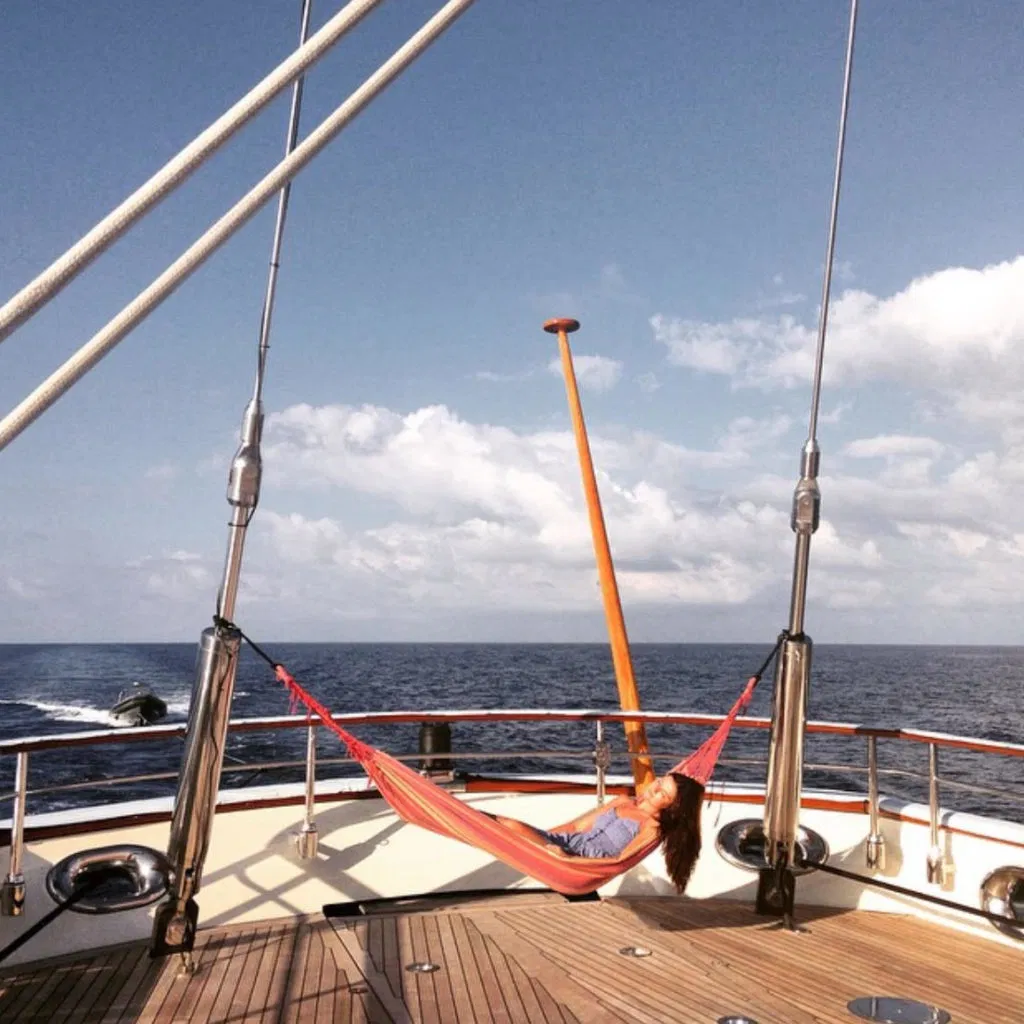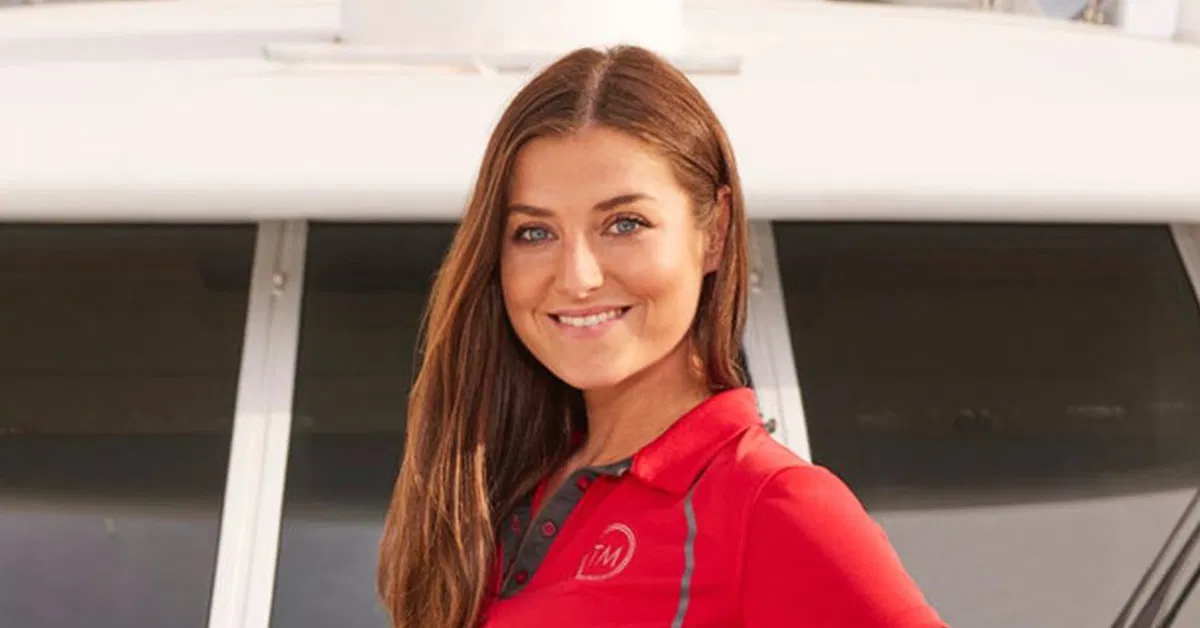Brooke Laughton is a very influential figure in the yachting community. The ex-yacht chief stewardess has 7 years of experience in the yachting industry and was previously a cast member of Below Deck Mediterranean and Channel 5’s Secrets of Superyachts. Brooke was an aspiring journalist from Manchester, UK, who graduated from university and worked in the most magnificent countries worldwide as a yacht crew member. Brooke was so kind enough to take part in an interview to answer some relevant questions relating to the yachting industry.
Please can you tell me about your vessel position and what a day looks like in that position…
I’ve worked on various different types of Vessels, Sailing yachts from 40-93m, expedition yachts, motor yachts and a luxury Catamaran. My previous 4 positions were as a Chief Stewardess.All different vessels will have different operations, such as sailing yachts being more tailored to the sport and so more rigorous preparation for stowing and securing the vessel for sailing and all crew members being involved in line handling and sometimes racing in regattas.As a Chief Stewardess, a typical day (on a trip) would centre around service/ mealtimes/event planning with a high focus on guest relations as well as overseeing other stewardesses within housekeeping and laundry. This position is basically managing the interior of the vessel to an extremely high standard and often juggling different tasks to achieve this.A typical day off charter (no guests on board) would be maintaining the interior state, undertaking time-consuming tasks you can’t do on charter such as polishing glassware/cutlery/ornaments and updating inventories. It would also consist of prepping for the next trip as it approaches- ‘detailing’ the interior (a perfect standard of cleanliness and organisation), provisioning, ordering flowers, to name just a few.What training did you do to get into this position?
In order to work on any vessel, you need the marine course-STCW. This is a course that focuses on safety at sea from firefighting, first aid, abandon ship protocols, crowd management and security etc. The course is only one week, and I took mine during University in Liverpool, UK.The second mandatory requirement is an ENG1 medical to check you’re fit to work at sea.Although there are plenty of other courses available for green crew, I never did this prior to starting as every boat has a unique style, and most existing crew would rather train the new crew in the unique style of that vessel. I think that now the industry is a lot more popular than when I started out, further developmental courses would be beneficial to make aspiring green crew stand out.During my time in the yachting industry, I obtained further courses such as my ‘Day Skipper Sailing’, ‘Power Boat level 2’ and my ‘WSET level2’ (for further wine and spirit knowledge). Some vessels even offer paid courses within your contract!How did you end up in the yachting industry? What was the process?
I studied Journalism combined with creative writing at University and loved the idea of being a travel journalist. As I was about to graduate, I knew I didn’t want to start a job working in an office and felt like I wanted to travel and have an adventure first (and somehow tie in a travel blog to keep up my writing), but I had no idea how I could make this happen.About a month before my final exams, I was watching TV, and Below Deck came on, the first time I had heard of the industry and decided to do some research on how I could do this for a few years. A few days after my last exam, I’d arranged to fly to the South of France with a pile of CV’s and stayed in a yachting specific hostel and began my job search there. Walking up and down the various marinas in the south of France handing out CV’s, meeting with yacht agents and networking with existing yacht crews all helped me land my first job- a beautiful 93m sailing yacht heading for a season around South East Asia! Needless to say, I never started that travel blog and stayed in the industry for 7 years.

What is your favourite yachting location?
It’s a super hard one but my top 3 would be the Galápagos Islands, Raja Ampat and Tahiti.
Can you share the highlight of your yachting career?
Probably getting the chance to explore the Galapagos, which is a UNESCO world heritage site and so really protected. It’s just such a beautiful place to experience nature and see the indigenous species. I would wake up to see seals sleeping in the tender, watching baby sea turtles hatch and surround the yacht. Yachting is the best way to experience once in a lifetime places on someone else’s budget.
And the lowest point of your career?
Probably the number of things that you have to miss because you’re on charter or in the middle of nowhere- the most stand out lowest point would be missing my sister’s wedding.
Were you or any of your colleagues ever vetted with background checks or ID verification for a job?
I’m not sure about this, but personally, I wasn’t, only reference checks!I think it would be super beneficial to the industry to have something like this in place to keep the owners and crew safe from the potential bad eggs out there.
What was it like working for the TV show Below deck? Was it different to other yacht charters?
Taking part in Below Deck was a really great experience, and we actually filmed on the same yacht where I did my first ‘day work’ 5 years before, so I felt it was meant to be! It was extremely intense, as you can imagine when doing an already high-pressured job but adding cameras 24/7 and a bunch of big personalities into the mix could feel like a pressure cooker at times. When it came time to leave, I was so ready but looking back, it was something I absolutely don’t regret.There were many of the same elements of a normal yachting job- charters, service, guest experience emphasis, laundry, housekeeping etc but just on steroids!
We crammed 9 separate 2–3-day charters into 6 weeks, and so we were all so burnt out at the end. I also think the guests (and sometimes the crew) ‘play up’ for the cameras, and so this can intensify it more than a normal yachting job.
Can you tell us about your own blog, 'The Nautie Yachtie Coach' and what made you start it?
I created the Nauti Yachtie Coach as a platform for green crew who want to join the industry but have no idea how. After Below deck, I received tons of messages about this, so I thought it would be beneficial to create this service.I wrote an eBook for beginners with literally everything detailed for this topic, from making the decision of whether the industry is right for you all the way to landing your first job and even includes interview techniques.
I also offer a CV writing service where I will create your entire CV as it is a totally different structure than a normal resume which some people find daunting. On top of this, I can provide 1-1 zoom calls with me to answer all questions and help carve out a tailored approach to start a yachting career.
What has life been like since you've left yachting?
Life has been totally different but still a big adventure. After I went ‘land based’, I continued to use my expertise in VIP hospitality and worked in a luxury safari lodge in South Africa as a butler and then moved to Saudi Arabia to work in a Royal Palace for 2 years. Following this, I moved to Dubai with my fiancé and decided it was time to fulfil my ambition of working for myself and have since started 3 online businesses.It's extremely difficult to go back to a 'normal' life following a yachting career, and I still and will always crave travel, challenge and excitement…
…however, when I left yachting in my late twenties, I felt I had taken enough from the industry and the experiences and was totally ready for the next!
Check out Brooke Laughton’s website and social media pages:





